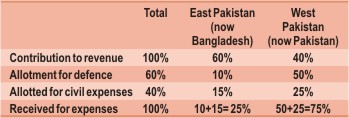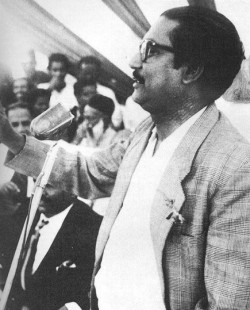|
 Chintito Chintito
History is easy, just study
Chintito
It is a churlish fact that the history of the War of Liberation 1971 and facts leading up to our most prized national achievement ever have been officially distorted over the decades, and shamelessly so by vested quarters only for their mere political survival. Thankfully, even a child understands that.
There are those few who say that everything the pure Bangalee say is not true. ‘Onek gap achhey,’ they utter, possibly with the same hope of a retreating terrorist bursting a canister of smokescreen to run away from reality and the people.
It is easy to sieve out the heroes and martyrs from the villains of this country without relying at all on the present pack of liars, few though they may be. They remind one of the murderer, who under oath told the judge that as he was checking the sharpness of the knife, his wife came and fell on it. ‘She used to frequently do such things, Your Honour, but the last time she was not so lucky’, he sobbed while wiping a tear from somewhere.
 The facts are in the past. The facts are available in our local and international newspapers of 1970-71, and earlier, and in official government documents of many countries, including India, Pakistan and the USA. Some of these documents are also available on the net. Search for them. Let me give you some excerpts from documents prepared by Pakistan, our sworn enemy then, on how unfair a deal we had to suffer for 24 years, from 1947: The facts are in the past. The facts are available in our local and international newspapers of 1970-71, and earlier, and in official government documents of many countries, including India, Pakistan and the USA. Some of these documents are also available on the net. Search for them. Let me give you some excerpts from documents prepared by Pakistan, our sworn enemy then, on how unfair a deal we had to suffer for 24 years, from 1947:
In those days it was illegal to carry gold from West Pakistan to East Pakistan, but legal from East to West. And they called it one country!
Why! Throughout March all the TV channels here have been running daily documentaries on the War, original b/w footages, for the world to see. See them. Arrange special screening of those scenes even when it is not March.
The tool of our struggle for self emancipation was Awami League president Sheikh Mujibur Rahman’s six-point programme (Choy Dafa), delivered on March 23, 1966, five years before our independence. The points called for Pakistan to be a Federation (of two wings, that is East Pakistan and West Pakistan) based on the Lahore Resolution (of two nations) with the Federal government dealing with only defence and foreign affairs, two separate currencies for the two wings, or one currency with constitutional provision for stopping flight of currency from East (Bangladesh) to West Pakistan, separate power of taxation and revenue collection for the two wings, separate accounts for foreign exchange earnings, and a militia or a paramilitary force for East Pakistan.
 |
Bangabandhu Sheikh Mujibur Rahman announces Six Points in
Lahore-- February 5, 1966.
Photo: www.genocidebangladesh |
The Sheikh practically took responsibility of liberating the people of this country from then on. The struggle was long and arduous, and meant years in jail for the greatest Bangalee that ever lived. The people thronged to his meetings, waited for his instructions, and obeyed them with the expectation of getting closer to having a free country of their own.
On January 18, 1969 came the 11-point programme of the Central Students Action Committee based in Dhaka University. Among other matters they called for total autonomy for East Pakistan, formation of a federation, and release of all political prisoners (including Sheikh Mujibur Rahman) detained under the Agartala Case.
The combined people-student movement, given impetus by the martyrdom of Md. Asaduzzaman Asad (of Asad Gate fame) January 20, 1969 near Chand Khar Pool and others, led to the release of Mujib from jail February 23, 1969. On that day at a rally at Ramna Race Course (Suhrawardhy Udyan since independence) the people garlanded Sheikh Mujib with the title Bangabandhu.
Even as Awami League launched its election campaign on 7 June 1970 from Ramna Race Course, ‘the Sheikh repeatedly held out the assurance that Islam was in no danger on the sacred soil of Pakistan’. (The Dawn, Karachi). And look how he has been labelled by the enemies of Bangladesh.
In his speech at Joydebpur, Bangabandhu ‘called upon the people to remain prepared to join a mass movement which he threatened to launch if the vested interests conspired against the “people’s victory” after the general elections’. (The People, Dacca, 1 November 1970)
At Bhanga on November 12, 1970, Bangabandhu declared that the next (1970) elections was the last chance for Bengalees. (The People, Dacca)
On 12-13 November there was a devastating cyclone and tidal wave in the coastal areas of greater Barisal, Patuakhali and Khulna districts. One million people died. The government of Pakistan lent little or no support to the survivors (25% of the population in some areas), prompting Bangabandhu to declare on November 26, 1970 for full autonomy for Bangla Desh, as it was then spelt in the media.
In the Pakistan National Assembly Elections, Bangabandhu’s Awami League won 167 seats out of 313. In the East Pakistan provincial assembly elections Awami League won 298 seats out of 310.
When it became clear that East Pakistan (name was changed....) would attain full autonomy, Pakistan People’s Party leader Z A Bhutto (father of Benazir) opposed and brought out the red herring of boycotting the yet-to-sit parliament. While apparently discussing the issue for two weeks with Bangabandhu Pakistan reinforced its military personnel and equipment in Bangla Desh. On the night of March 25, 1971, the ruthless Pakistan Army launched on the unarmed Bangalee the most heinous and cowardly military action in history, killing thousands, including Muslims (I say this especially because the Pakistanis then prided in calling themselves Muslims). All these events are well documented in local and international newspapers and periodicals. Over the following nine months, we lost three million souls, including children. Thousands of our mothers and sisters were rendered chaste. Countless were maimed. A nation had to sacrifice that much to have a land of its own, to speak in their mother tongue. Today we do.
We must understand how dangerous and suicidal the misrepresentation of historical facts is however insignificantly done, for one day the lies may attain such a pile as to be able to hide the truth; already they have cast a shadow on our glowing sun. But the ominous clouds shall clear.
<chintitoforever@gmail.com>
Copyright
(R) thedailystar.net 2009 |
